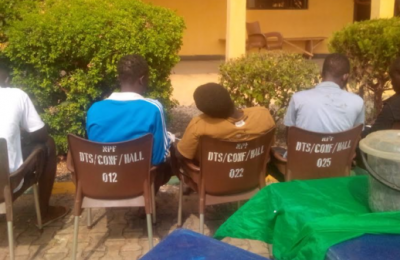
SOMETIME in 2011, the Central Bank of Nigeria (CBN) introduced the cashless policy into the Nigerian financial system. In a cashless society, physical money whether cash, cheques or coins is completely replaced by digital currency. That includes replacing debit and credit cards. Most transactions would be done through digital banking channels. It is not that money won’t be in circulation to transact businesses but unnecessary cash flow is greatly reduced. The CBN made it public in December 2022 that it would go into it full-swing by adding new steps to the implementation of the policy by the year 2023. Under this policy, the CBN has made it mandatory that a daily transaction limit for individuals would be #500,000 while it would be N3,000,000 for corporate bodies. The idea is to make transactions less cumbersome for everyone and to encourage electronic means of payments. Once there is little or no physical carriage of cash, it is believed that the rate at which armed robbers rob citizens would be reduced drastically. The ATM machines would also be free of constant targets by men of the underworld.
Before now, many lost their hard-earned money to hoodlums as soon as they withdrew money from the machines. This is because robbers loiter around ATM machine areas to perpetrate evil. It is believed with the emergence of this policy, people would not be at risk of being maimed or killed just because they carried cash around. In a nutshell, it is believed it would reduce cash-related robberies and cash-related corruption while attracting foreign investors into the country. It is also believed that a cashless society will help to close the financial inclusion gap. Again, it is believed to be a tool to fight corruption. This development will make it very hard for politicians to carry cash around as it is the norm especially during the election period. It is well-known that election period is a time people vying for political posts go around with raw cash with the excuse of using it to see to the running of their programmes.

It could also be a means to combat organised crime. Kidnappers whose job is to squeeze money from members of the society after picking people and extorting their families and friends will be rendered ineffective as there won’t be any waymeans for people to get large sums of money from banks as ransoms anymore. Once they know there is no way large amount of cash can be squeezed from people no matter how they tried, they may be dissuaded from the crime. The loss of physical cash during fire outbreaks would also be greatly reduced. Many traders prefer taking cash home and during fire outbreaks, they lose their hard-earned money. With this new development, cash is safely hidden in banks as customers pay electronically.
As much as this policy sounds so juicy and good, it could pose a lot of problems to the Nigerian state, especially at this period in time. One of such is the erratic state of electricity in the country. Poor power supply can affect the smooth running of this policy because as it stands, no state in Nigeria can boast of uninterrupted power supply for at least 12 hours straight in a day. We still have many communities in this country which have not seen electricity for many years. Some do not even have electric poles nor transformers! For this policy to work, each individual should be connected to the internet at least on their phones so as to be able to use the applications that would make transfers of money easy. This can not be possible in a community where there is no light. It also seems there is a higher concentration on urban centres to the detriment of people in rural areas. Many environmental developmental projects done by most state governments are usually in the cities.
There is no gainsaying that people in the rural areas are actually the ones who boost the economy when it comes to agriculture. Transactions are made between them and consumers both in small and larger scales. So, if there is no means of transferring money between sellers and buyers if it involves large cash just because there is no electricity or internet facility, this could pose a very big problem in the agricultural sector. There is also the issue of mass illiteracy. There are still a large number of Nigerians who cannot read or write. The issue of mass illiteracy is yet to be tackled by the different arms of government even at this point in time . A person who can neither read nor write may not be able to use a phone effectively. Therefore, making use of digital means of transactions may be hectic for such people. There are also cases of failed bank transactions. You might make transfers and your recipient won’t be credited for hours or days. There is also the issue of being debited more than once. There are cases whereby if you don’t go to a branch of your bank to make a report, you may not even get a reversal! Banks in Nigeria have been accused of not responding to mails promptly.
Imagine rushing a loved one to a hospital or you are helping another Nigerian who needs medical help impromptu, wanting to see a doctor on emergency but you are refused services due to a failed transaction; or buying food at a restaurant and unable to make payment with your ATM card just because the transaction did not go through due to a failed transaction which can not be corrected immediately. POS transaction failures take between 8 to 10 days to get resolved. Just like failed bank transactions on phones might take between same periods of time before reversals could . It could be concluded from these premises that Nigerian Banks in general do not resolve complaints speedily. There have been situations whereby customers take their cases to social media platforms like Twitter, tagging the banks and the Central Bank of Nigeria before cases get resolved.
Till now, the CBN has not made public a viable fraud prevention scheme to be used with the introduction of this policy. There should be one on ground to allay any fear the general pblic might have. There should also be sanctions for transfers that fail to reflect in at least 2 to 3 minutes. This may help push the banks to up their games.
There is also the issue of displays and spray of raw cash at celebrations like weddings, birthdays and other occasions. Nigerians prefer to splash money around rather than issuing cheques. This culture has been around for decades and even when there was a call for it to stop some years ago, it seems the Nigerian people are not ready to let go in a jiffy. This bastardisation of the naira should be stopped.
To make this work, there should be a way to re-orientate and educate the people on the advantages of using payments channels and making transfers rather than going the route of splashing the naira around which is seen as the ‘normal’ thing.
These are the issues.
- Ishola is on the staff of Nigerian Tribune.
YOU SHOULD NOT MISS THESE HEADLINES FROM NIGERIAN TRIBUNE
Nigeria Needs Stingy Leader To Develop — Obi
THE standard-bearer of the Labour Party (LP) in the February 25 presidential poll, Mr Peter Obi, on Tuesday, said the country needs a stingy leader to develop in all sectors…
Atiku Discusses Economy, Security With UK Government Officials
The presidential candidate of the Peoples Democratic Party (PDP), Atiku Abubakar, has met with officials of the British government to discuss issues bordering on economy, security, and immigration among others that are likely to be of mutual interest if he is elected the president of Nigeria…
Dear Nigerians, Resident Doctors May Go On Nationwide Strike (See Details)
The Nigerian Association of Resident Doctors (NARD) has warned to go on a nationwide strike if the federal government does not meet its demands…
What Makinde Must Do To Retain His Seat — Abdusalam, Ex-Oyo AG
Aare Abdulsalam Abdullah, a chieftain of the Peoples Democratic Party (PDP) and ex-Attorney General and Commissioner for Justice, Oyo State, in this interview with OLAWALE OLANIYAN, spoke about the chances of the re-election of Governor Seyi Makinde…
Lagos Port Operator Increases Export Charges, Threatens Nigeria’s Export Promotion







